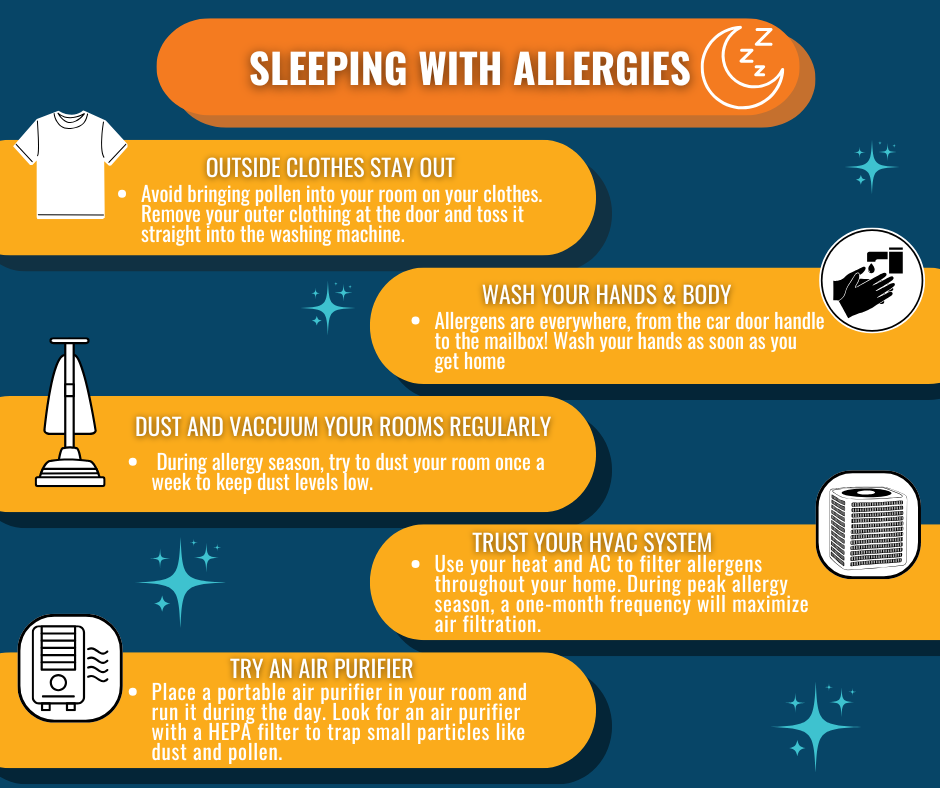Allergy sufferers in Decatur know the terrors of nighttime allergies: wheezing, coughing, tossing, and turning. Especially during allergy season, it’s important to address all possible irritants, not just pollen. Learn how to reduce allergens in your bedroom and get a better night’s sleep during northern Alabama’s extended allergy season.
Allergies and Sleep: What’s the Connection?
Due to various factors, allergy symptoms can worsen in the evening. For example, histamine, the chemical that triggers allergy symptoms in the body, peaks in the evening. Similarly, pollen levels also tend to peak at dusk. Body position, temperature, and humidity shifts can all work against a good night’s sleep during allergy season.
Roughly 40% of Americans have seasonal allergies. Considerable research links allergies to poor sleep, which contributes not only to daytime fatigue but also to an increased risk of developing sleep disorders.

How to Tackle Allergies in Your Bedroom
While it’s difficult to prevent exposure to indoor or environmental allergies, you can minimize it by:
1. Keeping Pollen Out
During allergy season, keep windows and doors closed, especially from late morning to early evening when pollen levels tend to peak.
2. Hitting the Showers
When you get home, remove your outer layers of clothing right at the door, and take a shower to get pollen off your skin and hair.
3. Banishing Dust From the Bedroom
Dust and vacuum your bedroom weekly to stay ahead of dust, pollen, and other contaminants. You may need to dust your bedroom every other day if you have severe allergies.
4. Keeping Pets Out of the Bedroom
Provide your pet with a cozy place to sleep in a separate room or at least on the bedroom floor.
5. Maintaining Your HVAC System
When in use, your home’s HVAC system helps to filter the air that circulates through your home. When pollen counts are high, turn on the heat or AC to capture indoor particulates. Keep your system in good, working order through regular maintenance, including filter changes every 1 - 3 months.
6. Using an Air Purifier
Add a stand-alone air purifier to your HVAC arsenal. Choose a portable option with a HEPA filter and run it in the center of your bedroom, where it can circulate and filter air without obstruction.
Read More: Three Ways to Combat Poor Indoor Air Quality
Where Should I Place My Air Purifier in My Bedroom?
Air purifier placement is critical for maximizing the device’s effectiveness. Ideally, place it near the middle of your room on a slightly elevated object, such as a sturdy shoebox.
The best place for an air purifier in a bedroom is where it can be seen from anywhere in the room. If it’s visible and unobstructed, it can circulate and purify air throughout the space.
Does Sleeping with a Humidifier Help Allergies?
Some individuals benefit from using a humidifier in their bedroom, but it’s not a universal solution. A portable humidifier can thin out mucus and moisturize nasal passages, making breathing easier. However, too much humidity can promote mold and mildew growth, worsening allergies. Keep your home’s humidity levels between 30% and 50% for optimal indoor air.
Take On Allergy Season with Help from Valley Heating & Cooling
We’re committed to offering Decatur residents professional, affordable, energy-efficient home HVAC services. Our technicians have the experience and resources to make cost-effective upgrades to help you and your family enjoy better indoor air quality, especially during allergy season.
Call 256-474-7550 or contact us online to schedule HVAC, electrical, or plumbing services in Decatur, Athens, and the surrounding areas.

